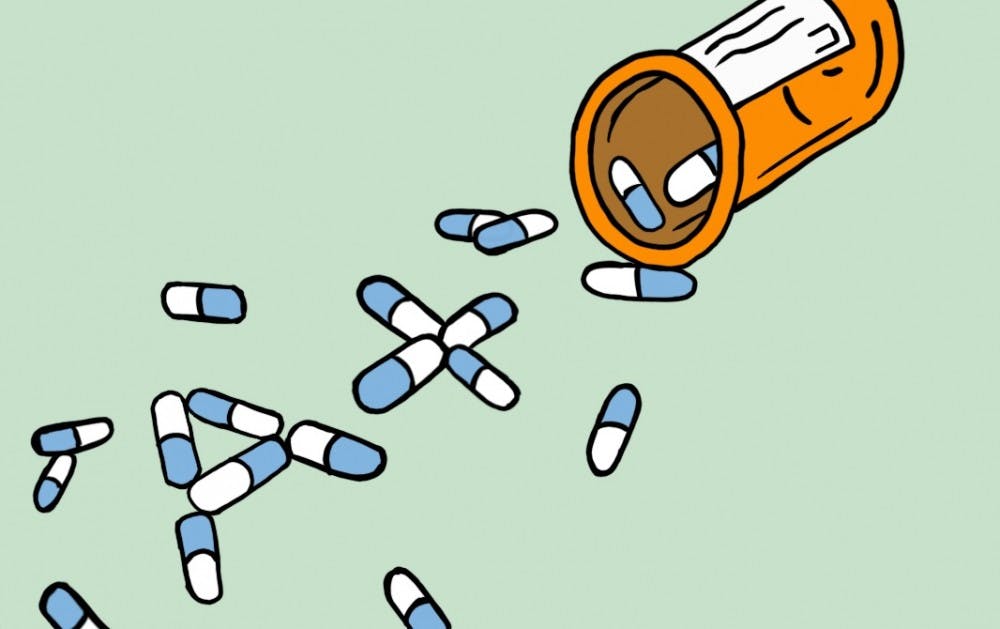In a letter to the editor published in December 2017, Addie Fairley, a business law junior at ASU, said that “if you have made it into college without the use of study drugs, you are more than capable of sitting down and studying on your own … turning to amphetamines is a cop out way of getting the job done.”
Unfortunately, this opinion is not held in isolation. Today, neurodevelopmental disorders such as attention deficit hyperactivity Disorder (ADHD) are highly stigmatized.
Joshua Brown, a freshman studying aerospace engineering at ASU, said his experience with ADHD has been difficult.
“It’s been rough,” Brown said. “You can’t quantify it physically. Everyone takes walking for granted, and if someone’s in a wheelchair, you can see that they can’t walk. Everyone also takes being able to read a page out of a book in a reasonable amount of time for granted, but if I’m not medicated that’s the kind of thing that can take over twenty minutes.”
The misinformation resulting in the abuse of stimulant medications should not contribute to the stigma against individuals who actually need them.
ASU students with ADHD should be allowed to get help, whether that be through therapy or by taking stimulants, without receiving harmful labels such as “lazy” or “unmotivated.”
College curriculum is often noticeably different from that in high school, meaning some students might not realize they have some degree of ADHD until they get to college and find it much harder to complete challenging tasks in a timely fashion.
John Barton, director of the Clinical Psychology Center at ASU, said there are multiple resources for students struggling academically due to ADHD.
“We have a program here for ASU students to enhance their organizational skills, time management, planning and study skills,” Barton said. “We also do cognitive behavioral therapy, and those are available at counseling services as well. We’ve got medication that can be obtained after an appropriate evaluation through health services, and we also do evaluations of ADHD.”
Stimulant medications have earned the reputation of being a “study drug” because they are often overprescribed — both in frequency and dosage — or abused. According to The Partnership for Drug-Free Kids, approximately 20 percent of college students have taken stimulants without a prescription, often for the sake of academic performance.
However, the claim that stimulant medications can function as “study drugs” is misguided, as taking stimulants to make up for missed or forgotten material in class has not been proven to boost academic success.
“If you have a normal brain, where you don’t have ADHD and you have normal levels of dopamine and norepinephrine, if you take something that’s going to give you more dopamine and more norepinephrine, you don’t need that much," Barton said. "That may push your cognitive function beyond what’s healthy and what’s beneficial.”
While individuals who take stimulants without prescriptions for last-minute studying are putting their own health at risk, this is an entirely separate issue from individuals who use stimulants for ADHD.
Many ASU students with ADHD recognize the risks and can speak from experience that stimulant medications, while effective, are often undesirable due to their side effects.
“I think that the attributes of ADHD are ones that we all have,” Barton said. “No one has perfectly attentive, perfectly still, perfectly decisive ... behaviors 100 percent of the time. ADHD is the extreme of attention overactivity and impulsivity and executive function deficits.”
ADHD as well as its remedies deserve to be treated with more validity, especially in school settings where the future of a student depends directly on his or her ability to focus in class.
“There’s validation (from being diagnosed), and that opens doors and pathways to treatment that might be unavailable for the undiagnosed,” Barton said.
Students at ASU can utilize a number of resources to aid their academic success, including counseling services and the Disability Resource Center.
“It’s the kind of disorder that a lot of people don’t understand unless you have it,” Brown said. “(Attention) is something that you just take for granted.”
Reach the columnist at kalbal@asu.edu or follow @KarishmaAlbal on Twitter.
Editor’s note: The opinions presented in this column are the author’s and do not imply any endorsement from The State Press or its editors.
Want to join the conversation? Send an email to opiniondesk.statepress@gmail.com. Keep letters under 500 words and be sure to include your university affiliation. Anonymity will not be granted.
Like The State Press on Facebook and follow @statepress on Twitter.




